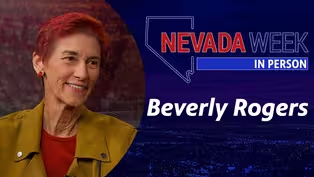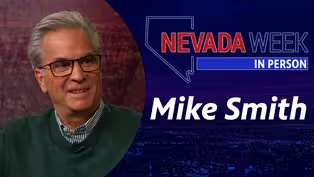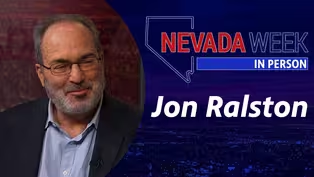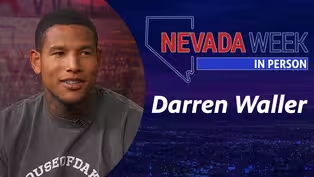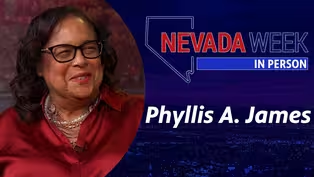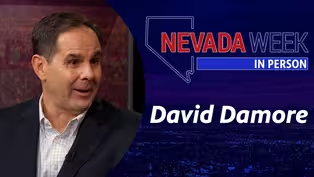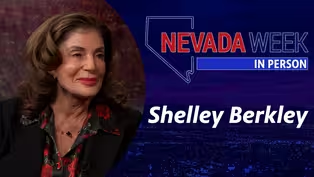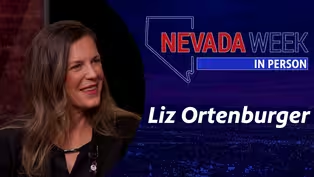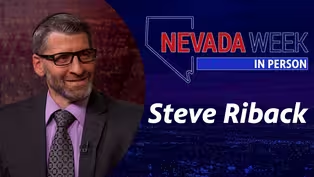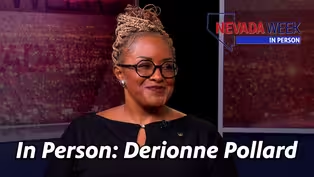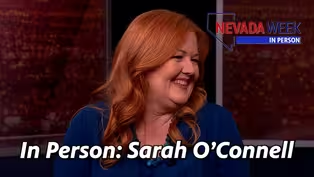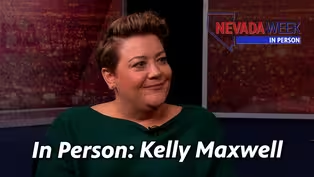
Nevada Week In Person | Mark Shunock
Season 1 Episode 24 | 14mVideo has Closed Captions
One-on-one interview with Las Vegas sports host Mark Shunock.
One-on-one interview with Las Vegas sports host and “Mondays Dark” creator Mark Shunock.
Problems playing video? | Closed Captioning Feedback
Problems playing video? | Closed Captioning Feedback
Nevada Week In Person is a local public television program presented by Vegas PBS

Nevada Week In Person | Mark Shunock
Season 1 Episode 24 | 14mVideo has Closed Captions
One-on-one interview with Las Vegas sports host and “Mondays Dark” creator Mark Shunock.
Problems playing video? | Closed Captioning Feedback
How to Watch Nevada Week In Person
Nevada Week In Person is available to stream on pbs.org and the free PBS App, available on iPhone, Apple TV, Android TV, Android smartphones, Amazon Fire TV, Amazon Fire Tablet, Roku, Samsung Smart TV, and Vizio.
Providing Support for PBS.org
Learn Moreabout PBS online sponsorshipMore from This Collection
Nevada Week In Person goes beyond the roundtable discussion of Nevada Week with guests for a more casual conversation about their personal passions, new projects and compelling stories that are overlooked in the flurry of the news cycle.
Nevada Week In Person | Beverly Rogers
Video has Closed Captions
One-on-one interview with Rogers Foundation chair Beverly Rogers. (14m)
Nevada Week In Person | Mike Smith
Video has Closed Captions
One-on-one interview with Las Vegas Sun political cartoonist Mike Smith. (14m)
Nevada Week In Person | Jon Ralston
Video has Closed Captions
One-on-one interview with The Nevada Independent CEO Jon Ralston. (14m)
Nevada Week In Person | Darren Waller
Video has Closed Captions
One-on-one interview with Las Vegas Raider tight end Darren Waller. (14m)
Nevada Week In Person | Phyllis A. James
Video has Closed Captions
One-on-one interview Phyllis A. James. (14m)
Nevada Week In Person | David Damore
Video has Closed Captions
One-on-one interview with Chair of the Department of Political Science at UNLV David Damor (14m)
Nevada Week In Person | Shelley Berkley
Video has Closed Captions
One-on-one interview Senior Vice President for Touro University Shelley Berkley. (14m)
Nevada Week In Person | Liz Ortenburger
Video has Closed Captions
One-on-one interview with SafeNest CEO Liz Ortenburger. (14m)
Nevada Week In Person | Steve Riback
Video has Closed Captions
One-on-one interview with Las Vegas Metro Police Lieutenant Steve Riback. (14m)
Nevada Week In Person | DeRionne Pollard
Video has Closed Captions
One-on-one interview Nevada State College President DeRionne Pollard. (14m)
Nevada Week In Person | Sarah O’Connell
Video has Closed Captions
One-on-one interview with Director of Eat More Art LLC Sarah O’Connell. (14m)
Nevada Week In Person | Kelly Maxwell
Video has Closed Captions
One-on-one interview with Baby’s Bounty Executive Director Kelly Maxwell. (14m)
Providing Support for PBS.org
Learn Moreabout PBS online sponsorshipIf you've gone to a Golden Knights game in Las Vegas, you have almost certainly heard his booming voice telling you "It's Knight Time!"
An arena host for the Golden Knights, the Raiders and Top Rank Boxing, Mark Shunock joins us this week on Nevada Week In Person.
♪♪♪ Support for Nevada Week In Person is provided by Senator William H. Hernstadt and additional supporting sponsors.
(Amber Renee Dixon) From Sault Ste Marie in Ontario, Canada, Mark Shunock developed a unique combination of skill sets as a child playing hockey, playing the piano and singing.
He would go on to goal-tend in the Canadian Hockey League and later perform in Broadway musicals, all before becoming an arena host for Vegas' first major league pro sports team, the Golden Knights.
Mark Shunock, thank you so much for taking the time to come in.
-Thank you for having me.
This is exciting.
-Yes.
Did you like that intro?
-It was great!
You should be my agent.
This is awesome.
Thank you so much.
-We were talking prior to going on camera about the crazy schedule that you are leading and next week doesn't have anything to do with the Golden Knights, but you are booked full.
What is going on?
(Mark Shunock) It's just a great week for Vegas.
You know, the National Football League is here with the draft.
-So you're going to be doing... -Yes, participating a little bit on the Bellagio stage, that incredible stage they're building over the fountains.
I'll be there.
Top Rank Boxing fight week here, a huge championship fight with Oscar Valdez and Shakur Stevenson at MGM Grand Garden.
There's a Mondays Dark event on Monday night.
The grand opening of the Palms, I'll be helping with that on Wednesday.
So it's a full week, but that's what makes Vegas amazing and I love it.
I wouldn't change it for anything.
-And Mondays Dark is so important, your philanthropy aspect, which we will get to.
Let's go back to life in Canada.
Describe to me this town, the importance of hockey, but then how also you got into singing and playing piano.
-Yes, I don't know how that happened.
Sault Ste Marie is a special place.
It is home for me.
It's where I grew up, and hockey is ingrained in everybody who grows up in Canada.
And being from Northern Ontario, home of the Sault Ste Marie Greyhounds, I spent my childhood going to the Memorial Gardens and watching hockey so it's a special place.
It's a historical place for hockey.
A lot of great players spent their time there in junior, Wayne Gretzky, Rick Tocchet, Jeff Beukeboom, Joe Thornton, Robin Lehner, Colin Miller, so a lot of guys played their junior days in my hometown, so it was a great place to grow up.
-Does your father have a part in that team?
-Yes.
So in 1988 the team was owned by Phil and Tony Esposito, amazing hockey legends, right?
They were going to sell the franchise to the Compuware organization in Detroit, Michigan, and it would have been at that time the first Canadian junior team to relocate to the United States.
And my dad was like hold up here, hold up.
We have a steel mill and a hockey team, and you can't take either out of our hometown.
So he approached the Esposito brothers and said hey, if we put a group together locally and matched the offer, can we keep it?
They agreed, and it's been a part of our family ever since.
Even to this day, my father is an amazing 83-year-old, just bull, who loves going to the games.
He doesn't miss any of them, and it's just a big part of our family.
-He's got to be awfully proud of you, but where did the singing and playing piano come in and how?
-I don't know, I think it was-- I'm the youngest of five, so we had a big family and dinners were always every night, all of us, all seven of us sitting at the table, and I don't think I got to say much when I was, you know, the youngest early on.
So I think I would get back to my room and listen to whatever music was popular at the time, and I think because I had four older siblings I was introduced to so many different styles of music and, you know, my mom encouraged me to just take piano lessons.
And I was that goofy goalie who would be on the ice singing from his crease when the play was down at the other end, and fans would hear me and they're like what is that kid doing out there?
You know, it was just a cool childhood and a special place to grow up like I said.
I love it there.
-The Canadian Hockey League, how does that work?
Because it was at what age you decided I'm not going to do hockey anymore.
-Yes, that was a tough call for me.
You play in the Ontario Hockey League from the ages of like 15 to 21, and it's an incredible program that feeds the National Hockey League.
If you look at how many players come from the Canadian Hockey League into the National Hockey League, it's significant but like anything else, you have to make those tough decisions and, you know, I probably could have gone on to play in Europe or in the minor leagues somewhere.
I'm not a big guy, but back then goalies weren't, you know, 6'2", 280 pounds like they are now.
It wasn't in the cards, so it was a tough call that day where I was like I don't think I'm playing hockey anymore and, you know, as a kid from Canada, everybody wants to raise the Stanley Cup.
-Okay.
Well, I think-- was it 19 years old?
-Yes, I was 19.
-There was a crucial trip to New York, and what happened there?
-Yes, we went to New York City for a little vacation, and I'd never been there.
And again growing up sort of isolated in Sault Ste Marie, I wasn't aware of these incredible theatrical programs that were offered by universities, NYU Tisch or Juilliard or, you know, Carnegie Mellon in Pittsburgh.
I didn't know anything about those programs, but I knew that I had this bug to be on stage.
I auditioned for a conservatory called the American Academy of Dramatic Arts.
It's the oldest English-speaking acting school on the planet.
It's not musical, it's just acting.
It's serious-- let's rip scripts apart and learn our lines, and I was fortunate enough to spend three years in that program.
I engrained myself in the theater scene in New York City and learned as much as I could and surrounded myself around as many incredible artists as I could, and the rest is history.
It took me on a different path.
-Well, part of that path being The Lion King.
-Yes, hakuna matata.
-What was your role?
-I got to play Timon, which was voiced by Nathan Lane in the movie, and I got to sing that iconic song that everybody sings along to, and that really changed the game for me.
You know, I was a part of this Broadway community and being able to share that story every night with families and their parents and seeing the kids come backstage and look at these incredible puppets.
You know, at that time I think it was the largest Broadway show going.
We toured the country for three years, and 20 semi-trucks would roll into a city and we'd take over.
It was something really special for me, and I will never forget it.
-You say "puppet," so when I've seen a picture of you, it's attached to you because you're painted; explain how that works.
-So Julie Taymor, who created the Broadway show and designed all these puppets, Timon was a four-foot puppet that was attached at my feet, my waist and my head, and my hands were free and I would operate this puppet.
Again, I mentioned I'm not that big, so it was almost as tall as I am, and I would just walk around and make this puppet come to life.
And I was painted green so that I would blend into the jungle behind me.
But it was just such an incredible experience, and to be part of a show that is so iconic in, you know, our culture and that song, everybody would start singing along with us, and it was great.
It was really great.
-So you continue into another musical, Rock of Ages.
Different role.
-Much different.
Iconic '80s music, a feel-good escape for two hours for people.
I think that's the most important thing as an entertainer or an actor or performer is that our job is to make you forget about your worries for a couple of hours.
When you walk into a movie theater or a live theater or even a sporting event, you want to forget all the BS that's going on in your life, and Rock of Ages really did that.
We came to Vegas, we played the Venetian for three years, and I thought well, I'm going to do this for six months to a year and then I'll go back to New York or L.A., and I never left.
Las Vegas is home; I love it here.
Coming up on a decade now this fall, and Rock of Ages, you know, anytime you get to sing Foreigner, Styx, Journey and REO Speedwagon for a living, that's a good gig.
-And then Magic Mike, not as a performer.
-Yes, we won't talk about Magic Mike.
-No, you don't want to?
-Yes, so the company that managed Rock of Ages was working with Channing Tatum, and they needed a goofy, kind of energetic opening to set the stage for these very attractive men to come out and rule the night.
It's emceed by a female host but she was a plant.
So I would come out dressed in just an awful outfit, gold chains, deep V, more product in my hair than I have now, and I'd sort of pretend that I was the host and I told some really raunchy jokes.
Eventually this woman calls me out and she takes over the show and becomes the master of ceremonies for the night, and then I would disappear.
So it was 10 minutes of stand-up to get the crowd pumped up and going, and then I would dart out the back door.
-But doing that job and your next job, the next job was the Golden Knights gig.
-Yes, the next job was the Golden Knights gig.
-So you must have been feeling-- I mean, here you are in Magic Mike and what are you thinking, like what is my future or what's next for me?
-It was a little weird.
I'd actually started-- while I was doing Rock of Ages, Bill Foley announced that he wanted to bring pro hockey to the desert.
I remember watching the news, just like everybody else going this is going to be awesome.
We got to get a hockey team here.
I literally picked up the phone and cold-called Fidelity Financial, and Todd Pollock, who's my boy to this day, he was the number-one employee, the only employee for Mr. Foley at the time, and he was in charge of this campaign called "Vegas Wants Hockey."
I called him and I explained exactly what I just said to you.
I was like I'm from Sault Ste Marie, my dad bought a franchise, a junior franchise, I know the game like the back of my hand.
How can I help?
So I joined the Vegas Wants Hockey committee, went to Mr. Foley's home and he said listen, your job is just to convince people in Vegas to give us a deposit for a season ticket.
Then I can go to the league and say hey, we got a fan base.
T-Mobile is being built, we'll get a team.
And I was like, this is great!
So I was literally like a little politician calling all my friends going can I get a thousand bucks for a team that doesn't exist?
Trust me, it'll be awesome.
But we did it.
We sold almost 15,000 season tickets in a month, which was slow by Canadian standards, because if that were to happen like it did in Seattle or a market in, you know, Canada, they'd sell out in minutes.
But we did it, and the league gave us a franchise.
Mr. Foley wrote a big check, and the rest is history.
They found out about my entertainment background.
Todd came to Rock of Ages.
Once they hired their front office, they said hey, do you want to be our host?
And I said yes, please.
-Was that in your head all along?
-No, not at all.
I put down deposits.
I still have season tickets to this day.
I work for the team, I still pay for tickets.
-Did your dad put down any money?
-He helped for year one, he sure did.
He was excited as well.
-Your success with the Golden Knights has led you to getting so many other jobs.
The Raiders, you're the in-stadium host for that, also Top Rank Boxing as I mentioned.
How different are all those venues in that type of-- I mean, how different is a Golden Knights game from let's say the Raiders, 60,000 people at Raiders Stadium?
-Yes, different sports.
But you know, my job as a "hype guy," if you want to just call it that, it really doesn't differ.
Sports fans are amazing and they're so passionate about their teams, especially in Las Vegas.
We have in my opinion some of the most knowledgeable, passionate fans, and a lot of people outside of Vegas would not agree with me because they think of Vegas as just the Strip and nobody's really from here.
But we have about 300,000 Canadians who call Vegas home.
We have season ticket members who are diehard hockey fans who followed other franchises prior to becoming, you know, ingrained in the Golden Knights culture.
So fans in Vegas are amazing.
Raiders games are outstanding, and we're spoiled because the facilities that we get to go and visit to watch these games are first-rate.
-It's been a different year, though, for the Golden Knights, not as successful.
So how have the fans been?
Have you had more trouble hyping people up?
Granted, you're coming off-- what is the date today, it's the 21st of April.
Last night was an overtime win for the Golden Knights, and I'm so thankful you came in this morning after all that hard work.
But I don't know, odds of making the playoffs are slim at this point.
-That's okay, that's sports, right?
And we've been spoiled.
For the first four seasons we've had incredibly competitive teams, that historical run in year one where we almost won the Stanley Cup so, you know, this is part of being a fan of a team.
You got to take the highs, you got to take the lows.
-Has it been a more difficult job for you this year?
-Not difficult just, you know, more challenging because I see the frustration in the fans on social media, we see the posts, but that just goes to show you how passionate our fans are about this team.
They care that much that they're actually going to take to social media and say some dumb stuff.
You know, I was going to say something else, but this is PBS and I'm not allowed to say that.
-Thank you for taking that into mind.
-But we've got great fans, and they got to take the good with the bad.
-Last question.
Mondays Dark, what is it, what should people know about it?
-Mondays Dark is a variety show that I started eight years ago when I was doing Rock of Ages.
It's a 90-minute variety show where I partner with a different local charity every other Monday night, and in 90 minutes, we raise $10,000 and write them a check.
Simple as that.
-Mark Shunock, thank you so much for joining us on Nevada Week In Person.
To see this week's edition of Nevada Week, tune in on Sunday at 5:30 p.m. or Tuesday at 7:30 p.m. or anytime you wish at vegaspbs.org/nevadaweek.
♪♪♪

- News and Public Affairs

Top journalists deliver compelling original analysis of the hour's headlines.

- News and Public Affairs

FRONTLINE is investigative journalism that questions, explains and changes our world.












Support for PBS provided by:
Nevada Week In Person is a local public television program presented by Vegas PBS
